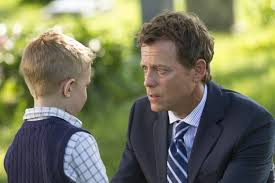Kirk Cameron is one of the leading figures in faith-based and inspirational entertainment. For the first time he has taken on the role of producer for a film he calls his most personal project. It is the story of his own journey to discover the answer to one of the central questions of faith and indeed of human existence: Why do bad things happen? The film is called “Unstoppable,” and it will be shown in theaters on a special one-night event on September 24. The trailer was initially misidentified as spam on YouTube and Facebook. After protests from a couple of million people, they apologized and put it back up with full access and, according to Cameron, “tickets are flying off the shelves.”
Cameron was nice enough to talk with me about “Unstoppable” and about his new project to help fathers guide their sons to manhood.
Is this a documentary or a feature film? It’s kind of mysterious.
Cool, I like mysterious! That’s great. People think of documentaries as dry, informational, fact-finding kinds of stuff. This is similar to what I did last year, “Monumental,” a journey with an exciting story, lots of artistic re-enactments of things that have taken place. It delves into the question: Where is God in the midst of tragedy and suffering? Why does God let bad things happen to good people? We’re discovering the answer to that question in a documentary, but it is done in a very dramatic, action-packed narrative story. It’s hard to slip it neatly into either one of those categories. I just call it my new film.
You’ve called this your most personal project ever.
It is a personal journey and I know it will be for everyone who watches it, not because I know everyone but because it is a universal question. It is in the top five questions in the world for everyone, atheist, Christian, Jew, Muslim, Hindu, Buddhist, everyone is rocked by this question. Where is God in the midst of tragedy? If He can heal me, why doesn’t he? Is He not listening? Is He not there? Are the atheists right? This is personal for me. We’ve been volunteering for 25 years at a place called Camp Firefly, for children who are seriously ill. My own family members are experiencing tragedy. I have skin in the game. I have a horse in this race. I want to understand why my 15 year old friend Matthew died. That sent me on this personal, transparent journey, to his funeral, to his burial, and then back to the Scriptures to understand the character of God, a God who would flood the world, who would pronounce a death sentence for the human race, who would allow tragedy and suffering, who would allow his own son to die on the cross and still say He is a God of love, mercy, and grace. I want to understand that.
Where do you begin?
I did not call Deepak Chopra, Rick Warren, Oprah Winfrey or any of the go-to guys for a lot of folks . I didn’t just want an academic answer to the problem. I can do that. I can solve the problem of evil logically, rationally, philosophically, theologically. I can wrap an atheist up in a bow and put him up on a shelf if he thinks I will question my faith with an argument like that. But that doesn’t solve the heart-crushing pain of a mother who is watching her child die of cancer. I wanted to take a journey into the heart and character of God and the only way I know to do that is by reading the book that He wrote, where He tells us the hows and the whys, going back to the Garden of Eden and the very first tragedy. That was not a fairy tale in a cartoon book. These were people making choices, and this is when tragedy and pain and fear entered the world. Then a brother murders a brother and then a whole culture becomes wicked and corrupt and God flooded the world and started over with a new man and a new woman and a new family and a garden and a promise that God would fix and change all of this. And that takes us to Moses, and then to Christ, the crucifixion and resurrection and then the destruction of the temple in Jerusalem. I’m taking a narrative story approach to this God who allows pain and suffering and steers all of it, to use what He hates to accomplish what He loves. All of this will work to the good for those who love Him. Ultimately, my authority is the Holy Bible. Everyone else is second banana.
What do you hope to accomplish with this film?
I want to do it this way so that everyone will watch it together, same night, same time, and then let the conversations begin, with atheists, believers, people from all different backgrounds. I hope people come out of the theater and say, “I love God! He is good and I can trust Him! He never takes His hand off the wheel, even though I am experiencing trials at the moment.” I want people to ask “Why?” Some people say you shouldn’t ask, or it’s not ours to ask. But if you don’t ask the questions, you miss out on the faith-building answers. The whole Book of Habakkuk would not have been written if she had not asked the question “Why?” It begins “Oh God, why do the heathen rage? Why is it that the wicked seem to prosper and Your people seem to be buried under tragedy?” It’s a fantastic book that starts with the question, “God, where are You? Why is this happening?”
How has being a dad influenced your feelings about these issues?
When you’re a teenager, you can say, “I love kids; I want to be a camp counselor.” When you have kids of your own, you say, “What did I let myself in for?” But there’s this deepening of love and compassion as a human being when you’re a parent because you’re responsible for this little soul. They look to you for everything. They trust you. They depend on you. When my friend called and told me that his 15-year-old was lying in the bed, dying of cancer and saying, “Daddy, can you fix me?” the only thing he could say was that God was the only one who could heal him. He could say, “I’m praying like a wild man that He will, but He knows what’s best.” As a father, that shreds you up. This has affected me very deeply as a father.
Tell me about the Boy’s Passage, Man’s Journey project.
project.
It’s a plan to help fathers make a plan for transitioning their boys into manhood. The subtitle is “Destination: Manhood.” Ask your husband, “When did you become a man?” Some will say when they moved out of the house, or got married, or became a dad, or joined the military. A lot of guys don’t really know when they became a man; they just slid into it sometime in their 30’s. In a lot of other cultures, there’s a marked time, a very significant moment, usually in the community of other men. In our culture, we don’t usually have that. Kids sometimes do that by being initiated into a gang or fathering a child outside of marriage as a way of proving their manhood. This is a way for fathers to help their boys become men in a positive way.


. This will be followed by a panel moderated by Gray, featuring Franklin along with Adam Hastings, Pure Flix Entertainment director of marketing and operations, whose 2014 “God’s Not Dead” earned more than $60 million domestic box office; Bill Reeves, founder of Working Title Agency, behind faith-market groundbreakers “Fireproof,” “Courageous,” “Soul Surfer,” “Heaven is for Real” and more; and Julie Fairchild of Lovell-Fairchild Communications, whose film work ranges from “Fireproof” to “Get Low,” “20 Feet from Stardom.” and “Heaven is for Real.”

